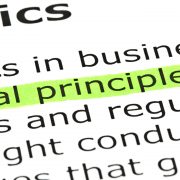The unprecedented interconnectedness of today’s world can give rise to new kinds of business structures that we’ve never seen before. An individual entrepreneur can build a global supply chain from the desktop, with custom manufacturing in China, automation software to manage the logistics of shipping and the related financial services like credit and insurance, sophisticated marketing automation, and precision delivery to the customer’s door. Single entrepreneurs and young start-up teams can download computing power from AWS and run algorithms and A.I. that they find open-sourced on Github. Freelance creatives can get projects from UpWork or join distributed global teams working together on large communications campaigns, and do better (in both performance and compensation) than they would have done while working at behemoths like WPP or Omnicom.
Efficiency, effectiveness and financial and business performance no longer have anything to do with size or scale. Nor, as Bill Gates points out, does economics. What we learned in school about supply and demand and economies of scale no longer applies. We need to unlearn it if we are to have any hope of understanding the future. His blogpost was prompted by reading Capitalism Without Capital, a book (by Jonathan Haskel and Stian Westlake) whose title tells us a lot about the possibility of new organizational structures for firms in the global economy where traditional measures of company size are no longer relevant.
So why, in this day and this age, do entrepreneurs have to put up with the term “small business”? It implies something inferior, less capable, or incomplete. And nothing could be further from the truth. So-called small businesses create two-thirds of the new jobs in the economy in a typical year, and account for just under half of GDP. Since there is a lot of output government fails to include in the flawed statistic that is GDP, especially in services and retail, it is probable that small businesses are a much greater component of real output. And now, with the new structures we can see emerging, they will no doubt account for much more in the future, probably in a way that is hard to understand for the government bureaucrats who try to measure and report these things.
Because that’s where the term “small business” originates and where it is maintained: in the bureaucracy of the administrative state. As the SBA (Small Business Administration) points out in their Table Of Size Standards (where “you can check whether your business is small”), their interest in size is all about how they can tax a business, regulate a business, subsidize a business or allow a business to sell to the government. Their size standards can be based on firm revenues (as the SBA defines revenue), and/or based on number of employees, and /or on structural or legal variables. And their criteria can vary by industry type and over time. It’s not an exact science, by any means. But once a business definition is determined to be “small”, a cascade of bureaucratic triggers are tripped and the appropriate tax, regulation, subsidy and procurement machines begin to roll. The result for the small business owner is generally seen in the form of the interminable stream of demand letters that appear, delivered by USPS: taxation notices, demands for compliance and reports, insistence on meeting various government codes, and so on and so on and so on, ad infinitum. Nothing helpful.
Not only is the characterization of a business as small, it’s insulting. Many so-called small business owners and operators find the term prejudicial. They are rightly very proud of their economic role and size is not something they focus on. Their concerns are about producing a great product or service, serving their customers immaculately, creating jobs for the community, addressing the creative challenge of continuous improvement and the personal challenge of wearing many hats as they deal with operations, finance, marketing and sales from one desk.
Here are some self-evaluations from entrepreneurs who were asked about their perception of the term “small business owner” (from carolroth.com)
SMB Owners Are The Risk Takers For The Rest Of Society.
Sometimes, people that work for large corporations can use “small business” in a negative connotation. I find this very frustrating, because the risks that small business owners take are so much greater than what they take working for a large company. They don’t understand the stress in being available 24/7 or knowing that you have other people relying on you for their livelihood. In fact, small business owners should be embraced by the public and the government for what they do–take risks.
Bob Bentz of ATS Mobile.
“Solopreneurs” Are Unique In The Important Resources We Provide.
Although I do identify myself as a small business owner (SBO), the phrase means many things to different people. If you’re trying to get a loan from the government, a small business can have 200+ people (see http://1.usa.gov/20RKwfF). Most SBOs would consider 200 people to be a large business. Many SBOs are by themselves, so my favorite term is “solopreneur.” I am proud to be part of the small business community. We provide important resources that I wasn’t aware of before I started.
Linda Lovero-Waterhouse of WSI Web Systems.
Small Business, Exceptional Customer Service, Big Loyalty.
There is great local support for small businesses. The top positive attribute people think of when they think “Small Business” is exceptional customer service and a willingness to go above and beyond for customers. Because of this service, customers remain loyal. Behind the curtain, being a Small Business Owner means that I can move faster and be more nimble than a large company. If I want to try something new, there is no red tape holding me back or board to go to for approval; I can innovate.
Michelle Stansbury of Little Penguin PR.
Operationally Excellent And Customer Focused.
After spending 20 years with a Fortune 200 company and 15 years owning a small business, I know which situation requires more knowledge and effort to succeed. Currently, I have several eCommerce properties and we compete with the big brands on a daily basis.
Small businesses can be both operationally excellent and customer focused. I know we can’t out-Amazon Amazon. But, we answer the phone every time it rings.
Robert Shirilla of Tapestry Throws.
Under-appreciated In Silicon Valley……
So, I think the term small business is a loaded term where I live. In SF, we often talk about startups and disruption, a small business isn’t capable of, quite frankly, growing quickly enough to be interesting to many people. I know that’s a local thing and not everyone is the next Uber… but in Southern California, I found the term small business to be a positive one… here, not quite as much.
Mark Aselstine of Uncorked Ventures.
…. Small Business Owners Are The Heart of America.
A “small business owner” is someone I consider the “Heart of America”. They are the people who have an idea, the desire to serve others through their talents, and the belief to make that idea a reality. These are not overpaid fat-cat CEO’s with Ivy League pedigrees. They are people like you and me, trying to provide for their family and contribute to their community. They are what people talk about when they say, “Buy American”.
Mike McRitchie of Critical Path Action.
You Can Make a Big Difference
Small Business is the life blood of the American economy. It accounts for 65% of new jobs created. If we were smart, we’d be developing programs that focus on helping this business segment with capital and mentoring to give existing small businesses a better chance to survive and create new jobs. The government should also be working with funding sources to foster the creation of more new businesses. I am very proud to be a small business owner. I can’t think of a higher calling.
Greg Gottsacker of North Star Business Systems, Inc.
Small Business = Huge Impact
No entrepreneur considers his business to be “small” and, yet, this is a category they may fall into. But no matter the actual size of the operation, the ideas, the reach and the impact of any “small” business is great and the charisma required of the owner to bring a business to fruition is huge. Your business and your efforts will make a big difference in many people’s lives. And that must always be acknowledged.
Kate Edwards of Kate Edwards Consulting, LLC.
Let’s Get Rid Of The Term “Small Business”.
In short, the term “small business” misses all the value and purpose of entrepreneurship: innovation, service, growth, job creation, community involvement, personal lifestyle and individual self-reliance. Let’s get rid of it.













